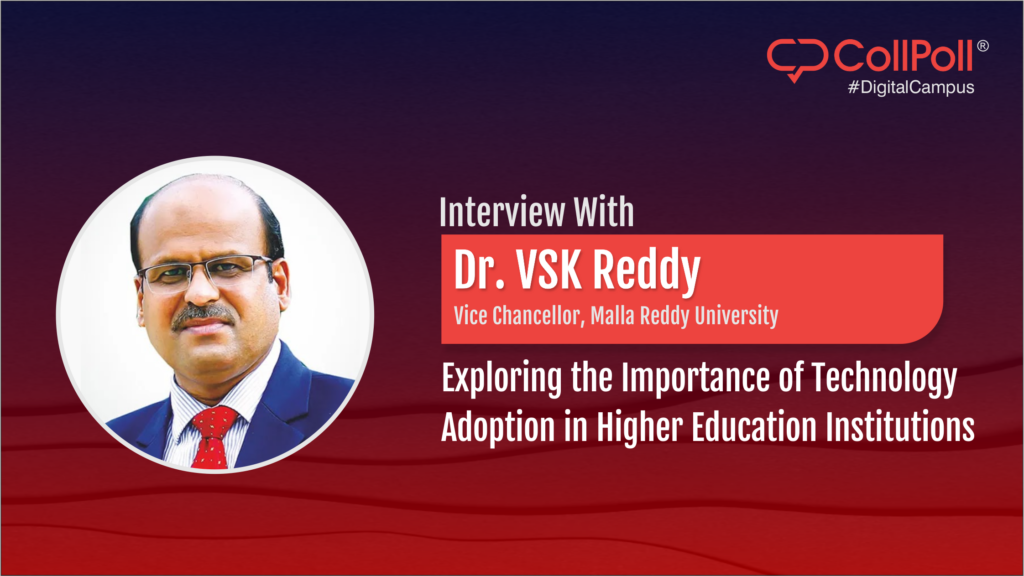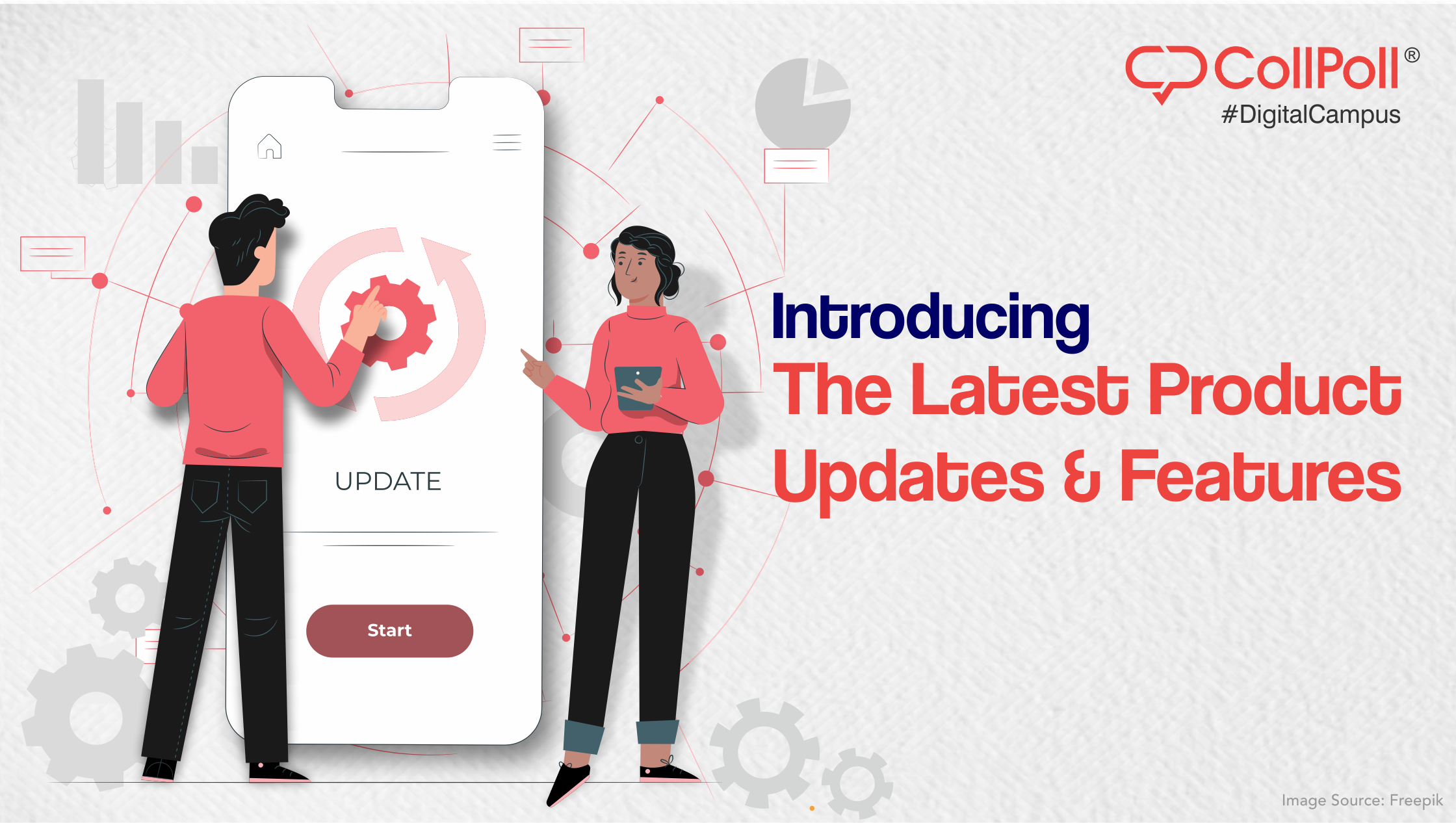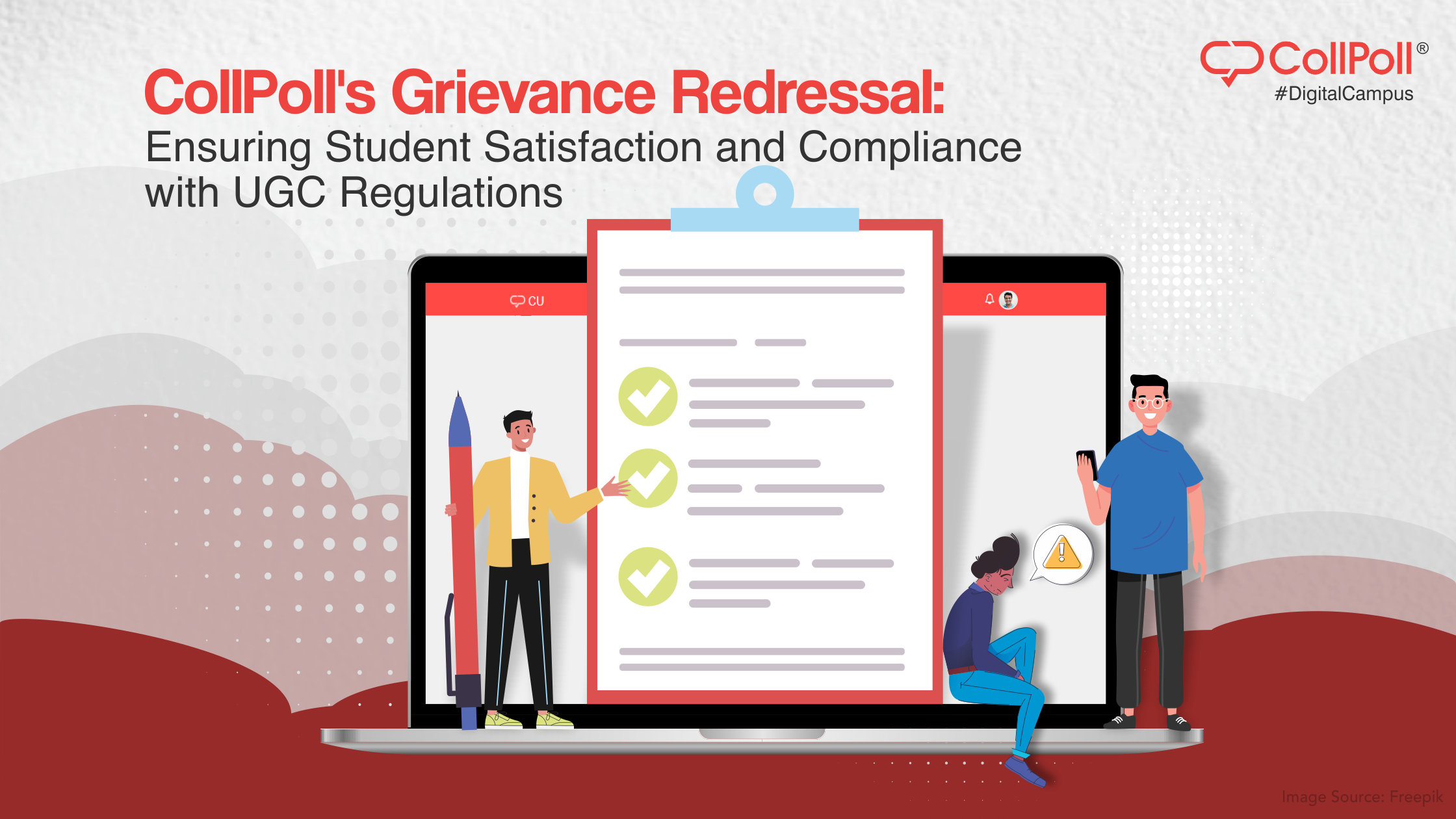As technology continues to transform the way we learn and teach, we believe that staying ahead of the curve is more important than ever. Thus, at CollPoll we aim at bringing together the knowledge, expertise, and insights of academic thought leaders, to deliver the right guidance to the institutions.
In this candid chat with the CollPoll team, Dr. VSK Reddy, Vice Chancellor at Malla Reddy University discusses the significance of adopting technology in higher education institutions and elaborates on the advantages that they can reap from its implementation.
About Dr. VSK Reddy!
Dr. VSK Reddy, Vice Chancellor at Malla Reddy University, holds over 25 years of experience in both academia and industry. With a PhD from IIT Kharagpur, he specializes in Signal Processing & Communications and Computer Science Engineering. He has published extensively, with over 150 publications in renowned conferences and journals. Dr. VSK Reddy is a fellow of IETE, a life member of ISTE, and a member of IEEE and CSI.
His academic excellence extends beyond the borders, as he has been granted the Education Fellowship by the British Council, UK. Dr. VSK Reddy is a highly regarded academician, renowned speaker, and visiting professor at various international universities in the UK and Malaysia.
What role do you believe senior management plays in driving the successful implementation of technology in educational institutions, and how has your experience in the academic industry shaped your perspective on this?
I’ve spent almost 25+ years in the academic industry. I firmly believe that when an educational institution’s leadership or senior management displays a strong commitment to embracing technology and actively participates in its implementation, the process of imparting technological knowledge to all stakeholders becomes much smoother.
Following my graduation from IIT Kharagpur, I embarked on a career in the teaching sector. After gaining years of experience and expertise, I felt compelled to share my knowledge on a broader scale, beyond my individual capacity. Ultimately, I believe that knowledge and skills are more effectively transferred when they originate from the senior management themselves.
What do you think is the role of technology in the higher education landscape? Could you provide insights into some of the best practices implemented by Malla Reddy University?
Malla Reddy University was established in the year 2020 as a part of the Malla Reddy Group of Institutions, Hyderabad. Through the implementation of a digital campus platform, we ensure effective communication and streamlined operations for students, faculty, administrators, and all stakeholders. We envision a digitally-enabled, paperless campus.
Technology plays a vital role in making operations seamless and transferring content to the stakeholders in a fast manner. It is essential to prioritize the adoption of technology within the institution, ensuring its widespread utilization. Furthermore, Malla Reddy University has integrated technology into its curriculum to enhance accessibility for all individuals, fostering an inclusive learning environment.
To meet the growing demand for technological advancements in various industries, we recognize the importance of staying up-to-date with the latest advancements in international regions and universities. With the support of our partners, we effectively implement technology and offer training opportunities within our institutions. By leveraging platforms such as Coursera, we provide training certificates alongside regular degrees, adding value to students’ upskilling and knowledge acquisition. This approach not only enhances the learning experience but also enables students to align their skills with industry standards and guides them towards future success.
Our commitment extends beyond the management of a digital campus; we also emphasize technology utilization as an integral part of students’ specialization, empowering them with practical skills and knowledge.
In light of the pandemic, there has been a significant transformation in teaching and learning methods. Looking ahead, what are your thoughts on the way forward – online teaching and learning, traditional on-campus education, or a hybrid approach combining both?
After the pandemic, the entire education system has shifted to online mode, making online teaching and learning a mandatory part of HIEs. While traditional classroom-based teaching on campus is often considered superior, it is essential to acknowledge the dynamic changes the world is experiencing and encourage the use of technology to promote online education.
In the coming years, online education is likely to be widely recognized and accepted across the higher education industry. Although the transition may be challenging initially, it is expected to yield fruitful results in the long run. However, offline teaching, on-campus experiences, and face-to-face interaction will always hold value. In the future, education will become more readily accessible online, and institutions should embrace technology to facilitate this transformation. Nevertheless, I believe, a hybrid approach that combines both online and offline modes of education is the most effective model.
What according to you are the top three reasons for every institution to adopt technology?
We are in an era of globalization. The technology is not restricted to one country/state. It is imperative that we embrace the digital transformation journey in tandem with the rest of the world. This is an opportune moment to introduce cutting-edge technology in every institution, not only to streamline operations but also to cater to the needs of the student community. By adopting technology, we can align our standards with international markets and universities, ensuring our competitiveness on a global scale.
With the booming IT industry, it is crucial for students to cultivate their skills and practical applications from the beginning of their undergraduate journey. Institutions must embrace technological measures to enable multidisciplinary and interdisciplinary education, equipping students with the necessary tools for success. Because today, technology plays a pivotal role in all aspects of higher education, spanning across various disciplines and verticals.
Could you share your experience as the technology partner of CollPoll at Malla Reddy University? What is MRU’s vision for becoming a digital campus?
For the last three decades, we have been trying to adopt technology in different verticals and courses. After the pandemic, digitization has become imperative for every sector. From assignments to exams and timetables to payment, everything is optimised by technology today. I believe a digital campus is essential for every institution to automate processes and deliver a better user experience.
We’ve partnered with CollPoll, one of the leading technology partners for HEIs. The platform has digitalised all our operations including attendance, fees management, learning management system, resource management, and examination management in a paperless manner via its range of modules. Now, everything is at our fingertips and we do not have to worry about the conventional way of doing things. The application helps us deliver an enhanced experience for all our stakeholders.
We truly appreciate the efforts of team CollPoll in delivering these services and helping in the implementation as well!
Thank You, Dr. VSK Reddy, for such a wonderful conversation, we look forward to having you again!
Keep watching this space for more interviews of CollPoll on higher education space and emerging trends!







